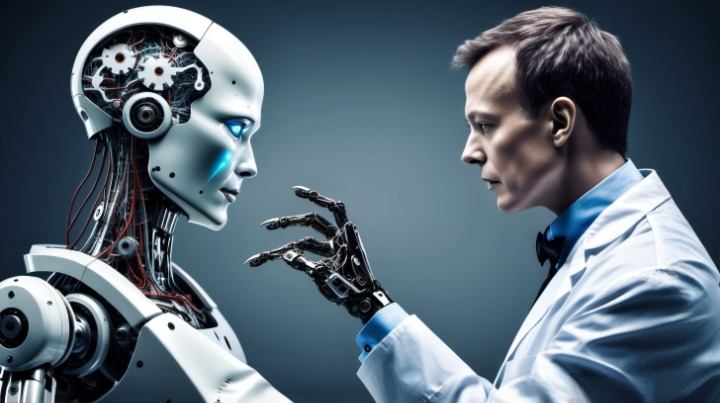Outline
- Introduction
- Brief explanation of artificial intelligence (AI) and human intelligence (HI).
- Understanding Artificial Intelligence
- Definition and characteristics of AI.
- Applications of AI in various fields.
- Exploring Human Intelligence
- Definition and aspects of HI.
- Unique abilities and qualities of human intellect.
- Differences Between AI and HI
- Cognitive abilities.
- Emotional intelligence.
- Creativity and intuition.
- Advantages of Artificial Intelligence
- Efficiency and productivity.
- Precision and accuracy.
- Handling repetitive tasks.
- Advantages of Human Intelligence
- Adaptability and flexibility.
- Social and emotional understanding.
- Complex problem-solving.
- Challenges of Artificial Intelligence
- Ethical concerns.
- Dependency and job displacement.
- Bias and discrimination.
- Challenges of Human Intelligence
- Cognitive biases.
- Emotional vulnerabilities.
- Limited processing capacity.
- Integration of AI and HI
- Collaborative approaches.
- Hybrid intelligence systems.
- Ethical considerations.
- Future Outlook
- Potential advancements in AI and HI.
- Impact on society and work dynamics.
- Conclusion
- FAQs
- What is the main difference between AI and HI?
- Can AI completely replace human intelligence?
- How can AI and HI complement each other?
- What are some ethical concerns regarding AI?
- How does human intelligence contribute to innovation?

Artificial Intelligence vs Human Intelligence
Artificial intelligence (AI) and human intelligence (HI) represent two distinct yet interconnected paradigms in the realm of cognition and problem-solving. As technology continues to advance at a rapid pace, the comparison between these two forms of intelligence becomes increasingly relevant. In this article, we delve into the nuances of AI and HI, exploring their differences, advantages, challenges, and potential for integration.
Understanding Artificial Intelligence
AI refers to the simulation of human intelligence processes by machines, particularly computer systems. Unlike traditional algorithms, AI systems are capable of learning from data, recognizing patterns, and making decisions with minimal human intervention. From self-driving cars to virtual assistants, AI finds applications across diverse industries, revolutionizing how tasks are performed and problems are solved.
Exploring Human Intelligence
Human intelligence encompasses the cognitive abilities and faculties inherent in human beings. It encompasses a wide range of traits, including reasoning, problem-solving, emotional understanding, creativity, and intuition. Unlike AI, human intelligence is characterized by its adaptability, empathy, and capacity for complex social interactions.
Differences Between AI and HI
While both AI and HI share the overarching goal of processing information and making decisions, they diverge significantly in their approaches and capabilities. One of the primary distinctions lies in cognitive abilities. While AI excels in processing vast amounts of data at incredible speeds, human intelligence possesses a depth of understanding and context that is often challenging for AI to replicate.
Moreover, human intelligence encompasses emotional intelligence, the ability to perceive, understand, and manage emotions effectively. This nuanced aspect of cognition enables humans to navigate complex social dynamics and form meaningful relationships, a feat that AI struggles to achieve despite advancements in natural language processing and sentiment analysis.
Another notable difference is creativity and intuition. While AI can generate innovative solutions based on existing patterns and data, human creativity stems from a combination of knowledge, experience, and intuition, often leading to breakthroughs and discoveries that defy conventional logic.
Advantages of Artificial Intelligence
The adoption of AI offers numerous advantages across various domains. One of the primary benefits is efficiency and productivity. AI systems can automate mundane tasks, streamline processes, and perform calculations at speeds far surpassing human capabilities, thereby enhancing efficiency and reducing operational costs.
Additionally, AI excels in precision and accuracy, particularly in fields such as healthcare and manufacturing, where even minor errors can have significant consequences. By leveraging machine learning algorithms and predictive analytics, AI enables precise diagnosis, personalized recommendations, and predictive maintenance, improving outcomes and minimizing risks.
Furthermore, AI is adept at handling repetitive tasks with consistency and reliability. From data entry to customer service, AI-powered solutions can handle high volumes of routine tasks efficiently, freeing up human resources to focus on more complex and value-added activities.

Advantages of Human Intelligence
Despite the advancements in AI, human intelligence remains indispensable due to its unique qualities and capabilities. One of the key advantages of human intelligence is adaptability and flexibility. Unlike AI, humans can quickly adapt to new environments, learn from experiences, and apply knowledge creatively to novel situations, making them invaluable in dynamic and unpredictable contexts.
Moreover, human intelligence encompasses social and emotional understanding, allowing individuals to navigate interpersonal relationships, understand non-verbal cues, and empathize with others. This aspect of cognition is crucial in fields such as counseling, leadership, and conflict resolution, where emotional intelligence plays a significant role in fostering trust and collaboration.
Additionally, human intelligence excels in complex problem-solving, particularly in situations where ambiguity, uncertainty, and ethical considerations come into play. By integrating diverse perspectives, critical thinking, and ethical reasoning, humans can tackle multifaceted challenges that transcend the capabilities of AI algorithms.
Challenges of Artificial Intelligence
Despite its numerous advantages, the widespread adoption of AI also poses significant challenges and ethical dilemmas. One of the primary concerns is ethical considerations surrounding AI systems, including issues of bias, transparency, and accountability. As AI algorithms rely on historical data for training, they may perpetuate existing biases and inequalities, leading to discriminatory outcomes in decision-making processes.
Furthermore, the increasing dependency on AI technologies raises concerns about job displacement and economic inequality. While AI automation promises efficiency gains and cost savings for businesses, it also threatens to disrupt traditional employment models, resulting in job loss and widening socioeconomic disparities.
Moreover, AI systems are susceptible to adversarial attacks and security vulnerabilities, posing risks to privacy, data integrity, and national security. As AI becomes more integrated into critical infrastructure and decision-making processes, ensuring robust cybersecurity measures and ethical guidelines becomes imperative to mitigate potential risks and safeguard societal welfare.
Challenges of Human Intelligence
Human intelligence is not without its limitations and challenges. Cognitive biases, such as confirmation bias and anchoring bias, can distort decision-making processes and lead to suboptimal outcomes. Moreover, humans are susceptible to emotional vulnerabilities, such as stress, fatigue, and cognitive overload, which can impair judgment and performance in high-pressure situations.
Additionally, human intelligence is constrained by limited processing capacity and cognitive bandwidth. Despite advances in education and training, individuals may struggle to assimilate and process vast amounts of information effectively, particularly in rapidly evolving fields where knowledge becomes obsolete quickly.
Integration of AI and HI
Rather than viewing AI and HI as competing paradigms, there is growing interest in exploring synergies and collaborative approaches that leverage the strengths of both systems. Hybrid intelligence systems, which combine the computational power of AI with the cognitive capabilities of humans, hold promise in addressing complex problems that require interdisciplinary expertise and human judgment.
Moreover, ethical considerations are paramount in the integration of AI and HI, ensuring transparency, fairness, and accountability in decision-making processes. By prioritizing human values and ethical principles, such as privacy, autonomy, and social justice, we can harness the potential of AI to augment human intelligence and enhance societal well-being.
Future Outlook
Looking ahead, the convergence of AI and HI is poised to transform various aspects of society, from healthcare and education to governance and entertainment. Advances in AI technologies, such as deep learning, natural language processing, and robotics, will continue to push the boundaries of what is possible, offering new opportunities for innovation and growth.
However, realizing the full potential of AI requires a balanced approach that prioritizes human-centric design, responsible AI development, and inclusive stakeholder engagement. By fostering interdisciplinary collaboration and ethical leadership, we can harness the transformative power of AI to address global challenges and create a more equitable and sustainable future for all.
Conclusion
In conclusion, the comparison between artificial intelligence and human intelligence highlights the complementary nature of these two paradigms. While AI excels in processing data and performing tasks with speed and precision, human intelligence offers depth, context, and emotional understanding that are essential for navigating complex social dynamics and ethical dilemmas.
By recognizing the strengths and limitations of both AI and HI, we can foster collaboration and synergy that harnesses the unique qualities of each paradigm to address the multifaceted challenges facing society. As we navigate the evolving landscape of technology and human cognition, it is imperative to prioritize ethical considerations, responsible innovation, and human well-being in the pursuit of a harmonious coexistence between artificial and human intelligence.
FAQs
- What is the main difference between AI and HI?
- The main difference lies in cognitive abilities and emotional intelligence. While AI excels in processing data and performing tasks, human intelligence encompasses empathy, creativity, and ethical reasoning.
- Can AI completely replace human intelligence?
- While AI has made significant advancements, complete replacement of human intelligence is unlikely due to the unique qualities inherent in human cognition, such as adaptability, intuition, and emotional understanding.
- How can AI and HI complement each other?
- By leveraging the strengths of both AI and HI, we can create hybrid intelligence systems that combine computational power with human judgment, enabling more effective problem-solving and decision-making.
- What are some ethical concerns regarding AI?
- Ethical concerns surrounding AI include issues of bias, transparency, job displacement, privacy, and security. Addressing these concerns requires careful consideration of ethical principles and societal values.
- How does human intelligence contribute to innovation?
- Human intelligence drives innovation through creativity, intuition, and interdisciplinary collaboration. By synthesizing diverse perspectives and experiences, humans can generate novel ideas and solutions that address complex challenges.




